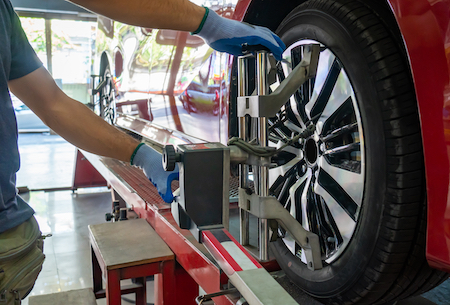As you drive, your wheels take the brunt of the ride. Every dip you move across, every bump you hit, every turn you make, your tires are there to keep your car balanced and you safe inside.
Glance at your wheels the next time you get into your car. The tires connect with the road, absorbing the shock of every pothole you hit. But the tires are just one part of your entire steering and handling system designed to help keep you on the road.
What is wheel alignment?
Wheel alignment is a simple repair designed to keep your car safe as you navigate the roads. It’s the process of positioning a wheel relative to how it sits compared to the other three wheels. It ensures proper balance when compared to the suspension and the tires. The entire surface area of each tire should conform to the road. That only happens when all four wheels are properly aligned.
When a mechanic performs a wheel alignment, they align the angle of the tires. This affects how each tire will make contact with the road. The mechanic will inspect and adjust three separate angles, including:
Toe – if you look down on your vehicle, the toe angle defines how much each tire turns inward or outward. When properly balanced, all four wheels should be perfectly parallel to one another.
Camber – when you stand in front of your car and look straight at the tires, camber would refer to the inward or outward angle. Camber angle is measured by the difference between the wheels’ vertical alignment perpendicular to the surface of the road. Camber is used to ensure full distribution of the load across the tread of the tires.
Caster – this refers to the angle of the steering axis when you view it from the side of your car. This axis should point up and down. Caster alignment will not impact tire wear, but it does affect the directional control of the steering function.
Wheel alignment is important to the life of a tire
Because driving involves regularly hitting bumps, dips, and potholes, wheel alignment seems like one of those maintenance items you don’t have to think much about. After all, you could hit a pothole leaving the service station.
Yet without proper wheel alignment, it can compromise the performance of your vehicle. This can influence everything from your car’s ability to brake properly to how much you spend filling up the tank.
It gives you a smooth ride – when your wheels are in alignment, you’ll experience a smooth ride. No shaking or vibrating. The wheels will operate perfectly parallel to one another, ensuring they stay well connected to the road.
It gives you better handling – when the tires are perfectly connected to the road, you’ll have better traction. Ever felt your car slip and slide in rainy or wet conditions? That increases without proper alignment. Traction allows you to be able to stop your car faster and in less distance. It gives you better control as you navigate the streets.
It increases tire life – when the wheels are out of alignment, they don’t make full contact with the road. That means your tire tread will wear out unevenly, increasing the chances they’ll need replacing.
It increases gas mileage – when your car runs smoothly, it operates as the manufacturer intended. When wheels are out of alignment, it can cause your car to pull to one side or the other while you drive. That makes your car harder to control, and can add up to increased fuel consumption as you fight to keep your vehicle moving down the road.
It’s necessary when switching tires – do you switch to snow tires or all-terrain tires to move through Colorado winters? Wheel alignment is necessary every time you switch out your tires to ensure proper contact with the road. Different tires, sizes, and treads all require their own unique calibration to keep them safely on the road.
What if you don’t get wheel alignment?
While you might not consider wheel alignment an important to-do item on your car maintenance list, think again. There are a number of reasons why wheel alignment keeps you safe and saves you money.
It keeps you safe – safety is everything when driving a car. And if your wheels aren’t properly aligned, it can put you in a dangerous situation. Over time, your tires will wear unevenly, which means they won’t connect properly with the road. That can put you at greater risk when it rains or snows.
It increases damage – wheel alignment is an easy, cost effective way to keep your vehicle running smoothly. If left unchecked, it can cause further destruction to your steering system. Occasional wheel alignments are much less expensive than replacing your tires before their intended lifespan.
It increases repairs – with over 10,000 parts on the average car, it can impact many more down the line when one part isn’t working well. That can cause your repair bills to escalate as one thing leads to another. If left unchecked, a faulty wheel alignment can lead to extensive tire damage, which can cause a blowout while you’re driving. At a minimum that might mean tow truck costs, or possibly the costs associated with an accident.
How many miles will a wheel alignment last?
Like other systems on your vehicle, wheel alignment should be a regular part of your maintenance routine. Most car manufacturers recommend getting an alignment every other oil change, which equates to about every 6,000 miles.
Of course, this varies depending on your vehicle and the way you drive. The rougher your road conditions, the more likely your vehicle will need aligning sooner rather than later. You can talk with a mechanic to find out what’s best for your vehicle.
When was the last time you scheduled a wheel alignment? Do it today.

